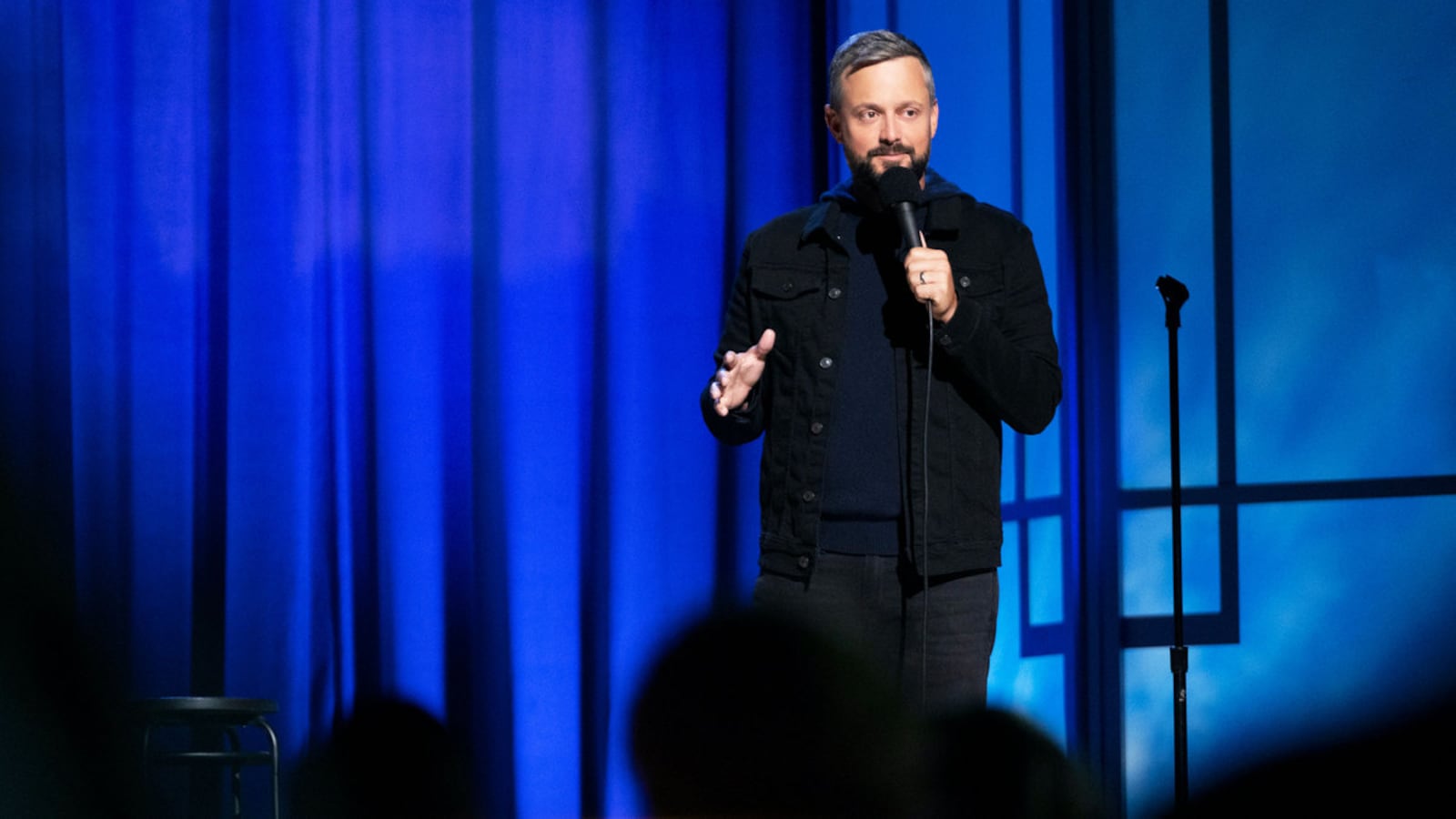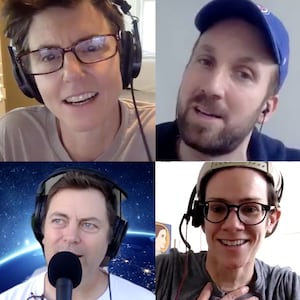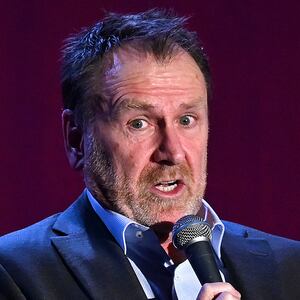Nate Bargatze has been a professional stand-up comic for nearly two decades, but every time he has to start putting together a new hour he thinks to himself, “I’m the worst comedian ever.”
“You can’t think of anything new and you’re like, ‘I am awful. I’m an awful comedian,’” he tells me on his return to The Last Laugh podcast this week. “So those thoughts don’t go away. You definitely have moments of like, ‘I’m pretty good.’ And then you have moments of like, ‘You’re out of your mind, dude, you’re terrible!’ So it’s a hard balance to figure all that stuff out.”
To be very clear, Bargatze is more than “pretty good.” With his understated Southern drawl and self-deprecating attitude on everything from his own comedy skills to his ability to help his young daughter with her homework—as he jokes about in the exclusive clip from his new Netflix special The Greatest Average American below—the 41-year-old has sneakily become one of the best stand-ups of his generation.
That’s why, when the pandemic shut down most live performance a year ago, Bargatze was not about to take a break.
“I was just like dying to get out,” he says. “And I wanted to do it safely. You don’t want to get crushed by everybody being like, why are you going out? And then Netflix came back and said, ‘Look, we think we can tape this special now. We have a way to do it.’”
He shot the special last October, outside at Universal Studios in Hollywood with a socially distanced crowd of just 100 fans who had to keep their masks on the whole time, making it hard for him to tell if they were smiling, let alone laughing.
After a rough first show, Bargatze managed to slow down and nail his second performance of the hour that night, producing what really is the first great stand-up hour of the COVID era—complete with jokes about the perils of coughing in public and people who are convinced they had the virus long before it came to the U.S.
Still, he’s reluctant to give himself too much credit. “I’m always aware that all of this could just go away,” Bargatze says of his rising comedy career. “All of this could fall apart at any minute. I always feel like that. I don’t think you ever want to take anything for granted.”
Below is an excerpt from our conversation and you can listen to the whole thing—including what happened to his ABC sitcom pilot and where he sees himself in the stand-up comedy pantheon—right now by subscribing to The Last Laugh on Apple Podcasts or wherever you listen to podcasts.
I’m really fascinated by how you were able to pull this off during this past year, and I really thought it’s your best hour yet. So how did this happen? Because not too many people have been putting out specials taped over this past year.
Well, I appreciate it, I’m glad to hear that. I’m a little nervous about this one.
Really?
Yeah, just because I had close to an hour before the pandemic started, but I would have had 50 theater shows to hone in that hour. And then all of that went away. So we weren’t doing anything and I thought, alright, I was hoping to do a special, it’s been two years basically since my last one [2019’s The Tennessee Kid]. But I was like, I’m not going to get to be on this timeline. And then it ended up working out. I did those drive-in movie theater dates to warm up for this. I mean, you’re always nervous before a special comes out. Because now the most people are about to see this and I’ve been doing it live and it's going good. If you’re watching me live, I can control things, I can put out fires. But people are just going to be at home watching it. So you’re always just a little nervous when it's about to come out. This could be terrible! I have no idea.
Especially when you’re performing at drive-ins, for cars, I imagine it’s very difficult to judge whether something’s funny or not.
You can’t really do new stuff. You get no response. I mean, you could hear some people sometimes up front, but some of the shows were the best shows I’ve ever done in my career. I mean, one in Chicago specifically, I’ll remember it for the rest of my life. I mean, it was 500 cars in this parking lot. It’s 40 degrees. It’s raining. It’s cold.
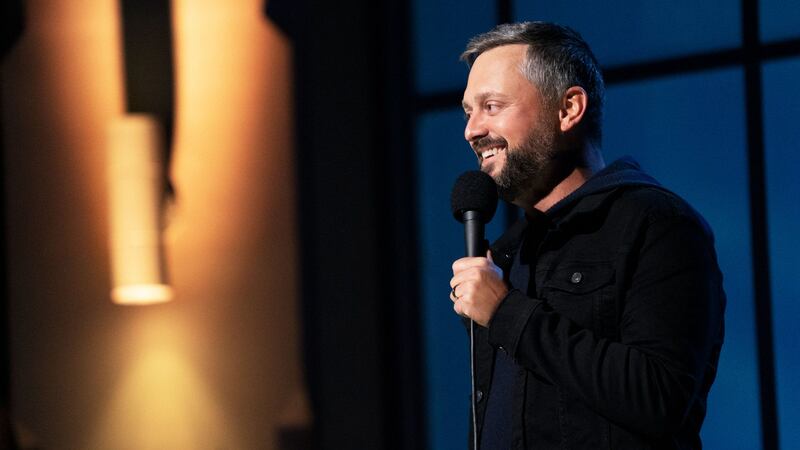
They’re probably warm in their cars, you’re cold.
They felt unbelievable. They had short sleeves on and they’re like rolling the window down because it’s too hot. Then when I walked down on stage, they would honk and flash their lights. They would honk as laughs. And you kind of learn that, oh, I just need some noise, you know? You just need a response.
You need something.
You need something. It felt like the closest thing I could ever have to a Woodstock moment, just this kind of magical thing. We’re all in this global pandemic, we’re in a parking lot, it’s cold outside and we’re doing a show. They were all amazing in their own ways, but I mean, I definitely am ready to get back into theaters.
So the new special is not for cars, but it is outside. When did you tape it and how did that all work?
It was the end of October. And everybody had to get tested. The audience had to get tested. It was only a hundred people. They all had to wear masks the whole show, social distance. It was at Universal Studios, outside there. Troy Miller, the director, did a really good job making it look like a lot of people were there.
Yeah, it looks really good, but a crowd of a hundred for a special is very small, right? How many people were at your last special?
I think it was a thousand at each show. So when you do an hour, you do two shows and basically edit it into one show. And usually every time you tape a special, after the first show, they’re always like, “We got it. We’re good. You can go mess around on the second show, have fun. Don't worry about it. We have the special.” But because they had masks on and I can’t hear their laughs—and I got kind of used to not hearing their laughs, but when I can’t see their faces, I can’t even see them smile. And so the first show—my set had been averaging out to like 64 minutes—I did 43 minutes. It was zipped up that tight. The rhythm was kind of gone. And so this was the first special after that first show where they were like, “Yeah, we definitely don’t have it.”
How did you adjust for the second show then?
So they had mics on all the tables and we put more of that in the monitor so I can kind of at least hear their laugh a little bit more. And then I had to slow down. It’s just so funny, because if you’re in a theater sometimes something that could take 40 minutes can take an hour. And then sometimes, something that could take an hour, if you're in a weird situation, you can tell it all in 40 minutes. It just really depends on just the energy of the crowd. And the crowd was amazing, but the scenario that we’re in, you can't do it. So the second show I was very aware that I needed to do more time and we put that in. I just kind of tried to keep my pace a little bit slower. So that’s what we did.
The whole opening of the hour is really about COVID and about this moment that we’re in and you can feel how cathartic it is for people to laugh at that. Is that something that you really thought about, putting that up front and addressing this weird time that we’ve all been going through?
Yeah, I figured you had to address it. There was no way not to. You don’t want to be crazy. You’re up there doing a special—we’re outside and the audience has on masks. So I always try to address something in a way that you’re not trying to make some big statement, you’re not trying to change anybody’s life. It’s just being funny about whatever’s happening. So I was like, I want to do it up top a little bit and then just get into my act.
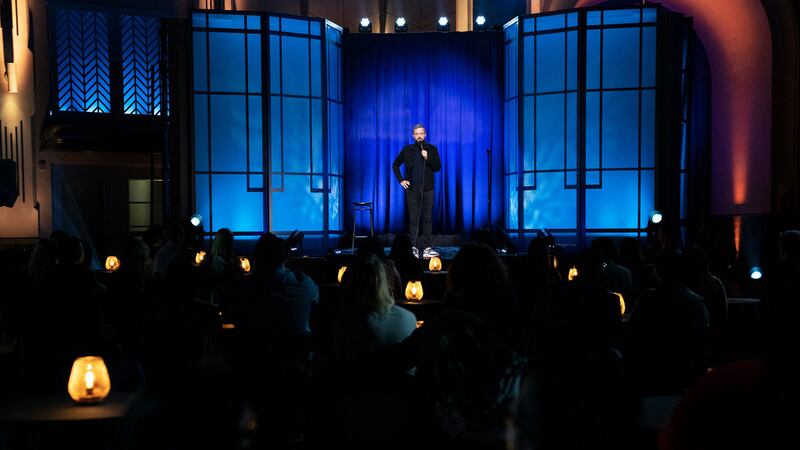
I love the line that you have that’s like “you want to be in the middle” on COVID. You don’t want to be too extreme in either direction. Is that sort of how you came to feel about it after several months, especially because you’re someone who’s traveling around, seeing how different states are dealing with it?
Yeah, I think with everything, it’s not bad to be in the middle. There are times where you’ve got to wear a mask and there are times where you’re like, I probably don’t need it here. Just be reasonable. And the middle is not a bad place to be right now, because you can make jokes from the middle. The sides are so far apart, so you can be pretty funny in the middle right now.
Talking about being “in the middle” on COVID, all of that stuff has become so politicized. So do you feel like that’s true for you as well, that you try to find that middle so that you can appeal to people all over the country?
Yeah. I have never had a real big desire to offend anybody. There’s a lot of comics that are like that and they’re great. I always make fun of myself a lot, I like being self-deprecating and I’ve always looked at it as like, you can either laugh with me or laugh at me.
You’re cool either way?
They both count as laughs, so I’ll take it! There’s enough of that other stuff, being political, being topical, that’s all it is. Politics has overwhelmed every facet of entertainment. You can’t get away from it. So I like being like an outlet that you can trust you’re not going to get lectured. I’m not going to lecture you about who you should vote for. It doesn’t matter. I don’t care. Go do whatever you want to go do. It’s just about being funny. That’s what comedy is to me.
Has that gotten harder in recent years, as things get crazier in the country, as things get more polarized, is it more difficult to avoid those things?
It definitely is. And then if I do it, like talking about COVID, you try to do it in a way where it kind of rides down the middle where you're making fun of the situation. It’s definitely hard, because you always hear people talk about their “platform.” I think too many people use their platform and they shouldn’t. My platform is that you can come to me and no I’m not going to do that to you. And I’m not going to say that I’m always going to do that. I have no idea. Everything changes. I might become a different person at some point, who knows, but right now I know that an audience has enough people telling them what to do. They don’t need me telling them what to do.
Next week on ‘The Last Laugh’ podcast: ‘The Daily Show’ correspondent and host of the new podcast ‘Roy’s Job Fair,’ Roy Wood Jr.
